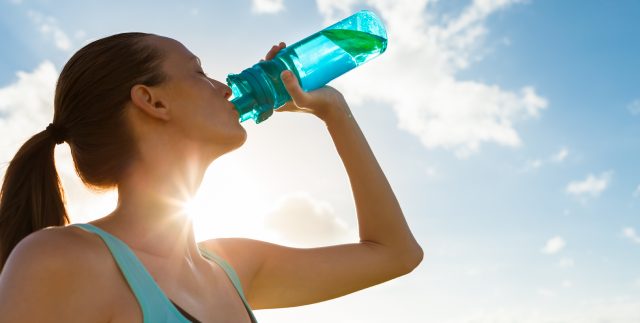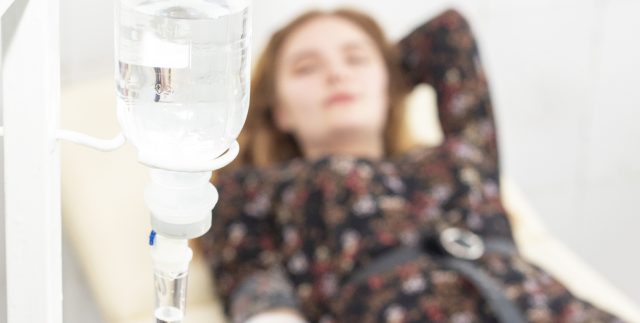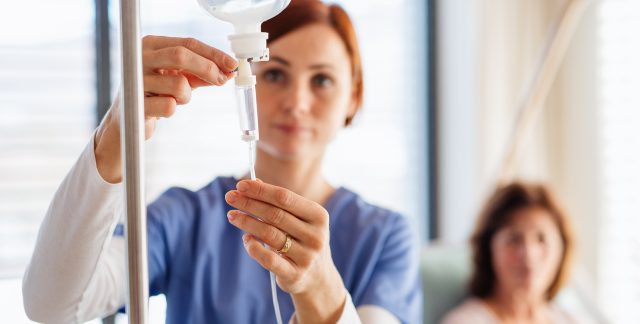IV fluids can sometimes mean the difference between life and death during a medical emergency. When a patient needs intravenous fluids administered quickly, there is no better option for treatment. Dehydration is one of the most common reasons for patients to be given an IV and, because dehydration can be life-threatening when left untreated. It’s important to know how to get treated fast. Can Urgent Care give IV fluids? Do you have to go to a hospital or emergency room? In this article, we will learn more about dehydration and how it can be treated by emergency care facilities in your time of need.

Dehydration: Causes and Symptoms
By definition, dehydration is a lack of a sufficient amount of water in the body. Because our bodies are roughly 60% water, it stands to reason that an adequate amount of water is needed for them to function properly.
Throughout the day, humans are constantly engaging in a fluid exchange process, where fluids are being lost and gained. Dehydration occurs when the body fails to reach and maintain an equilibrium of hydration and with it come a variety of potentially dangerous side effects.
Causes of Dehydration
As previously stated, the body is constantly gaining and losing fluid. We bring water into our system by drinking and eating water-rich foods; contrary to popular belief, humans cannot absorb water through their skin.
Humans lose water through the ways you might expect: sweating and eliminating. We also lose a small amount of water through exhalation, as water vapor is released through our breath. Dehydration occurs when we are not taking in enough fluids to supplement the amount of water our bodies lose daily. Simply put, the number one cause of dehydration is not drinking enough water!
It is especially important to drink water and keep yourself hydrated when you are experiencing the following:
- Excess Sweating, in response to activity or extreme heat
- Fever
- Vomiting
- Diarrhea
These conditions cause our bodies to lose water at a faster-than-normal rate and require active fluid intake to avoid dehydration and the need for medical care.
Symptoms of Dehydration
You may be moderately dehydrated if you are experiencing any of the following:
- Extreme Thirst
- Dry Mouth or Swollen Tongue
- Infrequent Urination
- Dark-Colored Urine
- Headache
- Muscle cramps
Chances are that, if it occurs to you that you’re thirsty, your body is already dehydrated. Be sure to drink the recommended amount of water each day as a preventative measure.

Treatment for Dehydration
In cases of mild to moderate dehydration, treatment can usually be provided at home. If you or a loved one is experiencing symptoms of dehydration, do the following:
- Slowly drink water, as too much water too soon could shock the system.
- Eat ice cubes or popsicles
- Drink something with electrolytes, like Gatorade. Electrolytes help regulate chemical reactions in the body and balance the amount of fluid in our cells.
- Avoid caffeine since it is a diuretic, and can dehydrate you further.
- Rest in cool shade
- Bathe wrists, ankles and neck in cool water to lower your overall body temperature

How Do You Know if You’re Dehydrated Enough to Need Treatment?
When left untreated, severe dehydration can cause seizures, lasting brain damage, and death. Symptoms of severe dehydration can include:
- Rapid Heartbeat
- Sunken Eyes
- Dizziness
- Confusion
- Fainting
- Lethargy
- Irritability
- Poor Skin Elasticity
If you are experiencing symptoms of severe dehydration, you may be at risk of serious injury or illness and should seek out help immediately. Head to an emergency room or an urgent care clinic to have IV fluids administered via a catheter and tube connected directly to the bloodstream.
IV drips transfer vitamins and electrolytes directly into your system under the care and supervision of trained medical experts. Medicine can also be given intravenously, as recommended, to treat potential infections and manage pain caused by dehydration.
Prevention
While dehydration is, for the most part, easily treatable, it is also easily preventable. To avoid dehydration, drink water whenever possible! Be especially sure to keep hydrated when:
- You feel thirsty
- You are out in hot weather
- You are exercising or sweating profusely
- You’re experiencing high fever, diarrhea, or vomiting
Infants, young children, older adults, and individuals with chronic illnesses or specific medications can be considered more at risk for dehydration. These individuals should take special care to monitor their fluid intake or have it monitored for them.

Village Emergency Centers: Emergency Room vs. Urgent Care Center
Now to the point: can urgent care give IV fluids to treat dehydration? The answer is yes. An urgent care facility is equipped to handle cases of severe dehydration and can provide an IV drip to treat your condition. However, emergency rooms are also fully equipped to treat dehydration and are open and operating 24/7, meaning you can get treatment whenever it is needed. Emergency rooms also specialize in providing life saving treatment fast, meaning that people suffering from dehydration may receive medical attention more quickly and efficiently by opting for emergency room care over that of an urgent care clinic.
The important thing is that you or a loved one reach out immediately for medical assistance when dealing with symptoms of severe dehydration. No matter where you’re being treated, we want you to experience fast, caring, and effective treatment whenever you need it most.
